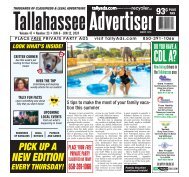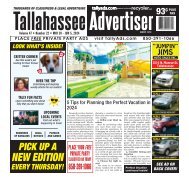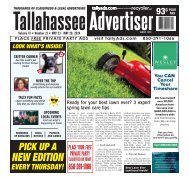The Trucker 060120
Create successful ePaper yourself
Turn your PDF publications into a flip-book with our unique Google optimized e-Paper software.
THETRUCKER.COM<br />
I am sick of COVID-19. I am sick of staying<br />
home. I am sick of everything being closed.<br />
I am sick of people getting sick and dying. I am<br />
sick of not knowing how best to move forward.<br />
I am sick of not knowing when this will end.<br />
In other words, I am sick of this whole<br />
damn mess. And I don’t think I am alone.<br />
We are living in crazy times. COVID-19<br />
has, quite simply, changed everything. <strong>The</strong><br />
way we live and work has changed, for likely<br />
forever.<br />
Now, before you think I am an eternal pessimist,<br />
I want to say that I do think we will<br />
come through this better and stronger — albeit<br />
different — than we were before. We have<br />
faced crises before and have always prevailed.<br />
However, as is the case immediately following<br />
most catastrophes, the government may<br />
restrict certain liberties we previously enjoyed<br />
in order to gain control over the situation. For<br />
example, 45 days after 9/11, the government<br />
passed the Patriot Act. In essence, the act allowed<br />
the government to search things — such<br />
as telephone, email and financial records —<br />
without a court order. Many of the provisions<br />
of the original Patriot Act were set to expire<br />
Dec. 31, 2005; however, many of the provisions<br />
have been routinely reauthorized and are<br />
valid today. Many were just reauthorized in<br />
March of this year.<br />
All this brings me to our current situation.<br />
It appears that the best way to contain the<br />
spread of COVID-19 in a partially opened<br />
economy is through: (i) extensive testing;<br />
(ii) use of personal protective equipment; and<br />
(iii) the ability to track individuals who have<br />
the virus or who have been in contact with<br />
those who have the virus.<br />
It is the last one that gives me pause.<br />
Hong Kong, Singapore, Taiwan and South<br />
Korea have all employed this method and have<br />
enjoyed “success.” (I hate to say success, as<br />
people are still dying.) However, in addition to<br />
using humans to trace the virus, they also employed<br />
surveillance technology. This is where<br />
my heartburn begins.<br />
Apparently, the U.S. and several European<br />
countries are now considering a similar use<br />
of surveillance technology to help track those<br />
who have the virus or who have been in contact<br />
with those folks. In fact, Google has been sharing<br />
some of its information on the location and<br />
movement of its users to assist researchers and<br />
doctors as they combat the virus. Moreover,<br />
a team at MIT has developed a proximitytracking<br />
application for those who have been in<br />
contact with COVID-19 patients. In addition,<br />
Google and Apple have already developed<br />
Perspective June 1-14, 2020 • 13<br />
Pandemics, emergency situations call digital privacy protection into question<br />
Brad Klepper<br />
exclusive to the trucker<br />
Ask the<br />
Attorney<br />
apps to allow for voluntary contact tracing.<br />
Now here is where I do a bit of disclosure<br />
about myself. For what it is worth, I am NOT<br />
a hard-core conservative, nor do I value a robust<br />
economy over human life. I am also NOT<br />
a far-left liberal who believes that the economy<br />
doesn’t matter and the government should do<br />
whatever is necessary to support me through<br />
this crisis. I consider myself one of the few remaining<br />
moderates in the world (there are actually<br />
three of us, and we work eight-hour shifts<br />
so someone is always on duty).<br />
With all that being said, I understand that<br />
there is some need for the government to track<br />
the spread of the disease and that, like it or not,<br />
some surveillance will likely be implemented.<br />
My concern is with what information will be<br />
gathered, how long will it be gathered and how<br />
will it be used.<br />
For example, South Korea collects data<br />
from cellphones, GPS, public transportation,<br />
credit-card data, immigration data and other<br />
sources. While all this information can be useful<br />
in tracking people’s movements, I struggle<br />
with the additional implications.<br />
For instance, if the “magic” number of<br />
days for a person to be quarantined is 14,<br />
I would assume this would be the relevant<br />
period of time I would need to be “tracked.”<br />
However, what happens to my information<br />
after the 14 days? Is it deleted or erased? I<br />
doubt it. However, it should be. If 14 days is<br />
the magic number, then there is no need for<br />
the government — or anybody else — to know<br />
where I am and what I am doing beyond that<br />
time frame.<br />
Also, what about my private information<br />
that such surveillance may disclose? What if<br />
I am visiting the oncologist for cancer treatment?<br />
Or meeting with my lawyer? Does the<br />
government (or anyone else) need to know this<br />
information?<br />
Moreover, can you imagine the dollar value<br />
associated with the history of everyone’s movements?<br />
What would a company/person pay to<br />
have that information? To be able to know all<br />
that information is invaluable. Sure, some of it<br />
is already available, but nothing to this extent.<br />
I guess, at the end of the day, I understand<br />
that some of this information may be necessary<br />
to prevent the spread of COVID-19 and save<br />
lives. I am at peace with that. However, there<br />
need to be safeguards put into place to guarantee<br />
that our privacy is protected and that only<br />
the information that is necessary is used —and<br />
only for the relevant time frame.<br />
In other words, we need a digital bill of<br />
rights.<br />
I wish I could say that this was totally my<br />
idea, but it is not. It has been around for years.<br />
<strong>The</strong> current crisis has just brought it back to the<br />
forefront. At the Global Forum on Artificial Intelligence<br />
last year, French President Emmanuel<br />
Macron argued for government to implement<br />
a bill of rights providing for fundamental<br />
See Attorney on p16 m<br />
DRIVE FOR P.I.& I.<br />
APPLY ONLINE NOW<br />
www.piimx.com<br />
• Local, Regional & OTR<br />
• Percentage Paid Weekly<br />
• Great Home Time<br />
• Company Paid<br />
Employee Benefits<br />
• Paid Holidays<br />
• Tuition Reimbursement<br />
• Pay Guarantee<br />
- $725.00 Local<br />
- $850.00 Regional<br />
866.819.8913 PAID TRAINING PROGRAM FOR COMPANY DRIVERS

















